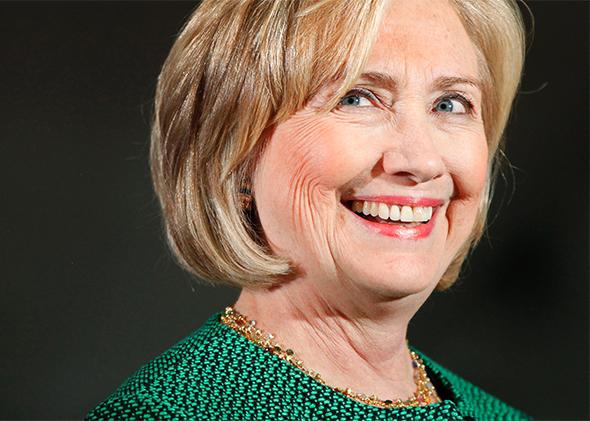The Hillary Clinton campaign exists in something like a state of quantum uncertainty. On one hand, it’s there. There are staffers and strategists and donors who are preparing for the start of the Democratic presidential primaries. But Clinton herself hasn’t agreed to run, and until she does, this organization is the equivalent of Schrödinger’s cat—both alive and not-so-alive.
But even in its uncertain state, this quantum campaign is practically the only game in town. Without announcing a candidacy—or even signaling a decision—Clinton has amassed a team of big-name Democratic operatives. On Tuesday, for example, the not-quite Clinton campaign enlisted Joel Benenson as chief strategist and Jim Margolis as media adviser. Benenson comes from Team Obama, having worked as lead pollster on both of the president’s campaigns, while Margolis is a longtime adviser to Senate Minority Leader Harry Reid. Also joining the Clinton effort are two other Obama pollsters—John Anzalone and David Binder—and rising operative Robby Mook, who managed Terry McAuliffe’s 2013 campaign for Virginia governor and is expected to handle day-to-day operations for Hillary 2016.
Former Obama campaign manager Jim Messina is leading the pro-Clinton Priorities USA super PAC, while—as Alex Seitz-Wald reports for MSNBC—Jennifer Palmieri, a former spokeswoman for John Edwards and the current White House communications director, is “said to be in the mix” to lead Clinton’s communications team. And White House adviser John Podesta—who served in the Bill Clinton administration, managed Obama’s 2008 transition, and led the Center for American Progress—will join the Clinton operation next month.
Most measures of Hillary Clinton’s inevitability rely on polls, and for good reason. By the polls, Clinton is absolutely dominant. In the most recent Huffpost Pollster average of the Democratic primary field, Clinton takes 62 percent of the vote. Her closest competitor, Elizabeth Warren, earns just 12.3 percent of the vote. The sitting vice president, Joe Biden, receives even less, at 9.6 percent. President Obama aside, there’s no one in the Democratic Party as popular as Clinton.
At the same time, polls aren’t durable. A sudden change in the landscape—an immensely appealing alternative, for instance—could destroy Clinton’s polling advantage. The real measure of strength in a presidential primary isn’t polls, it’s institutional strength. The candidate with the greatest party support—from activists and professionals to lawmakers and donors—almost always wins the nomination, even if he or she stumbles in the actual contests. Clinton’s problem in 2008 was that she couldn’t consolidate the party. There were powerful dissenters, and they coalesced behind another, equally viable candidate in the form of Barack Obama.
Yes, there are still anti-Clinton dissenters in the Democratic Party. But unlike in 2008, they don’t seem to have an institutional base. Indeed, if these hiring choices are any indication, the large bulk of the party’s machinery is already in Clinton’s corner. Take Margolis. The fact of his relationship with Reid is a huge deal, given the extent to which Reid encouraged and supported Obama in his presidential bid. It’s a sign of lowered resistance to Clinton. The same is true of her support from key members of Team Obama. If there were a viable anti-Clinton faction, odds are good it would draw from the last party fight. But the veterans of 2008 aren’t interested in tackling Clinton again—they want to fight under one standard.
The Republican field is larger and more fractured than the Democratic one, but this basic rule still applies. The candidate with the most institutional support is the candidate most likely to win the nomination. And “institutional support” goes beyond the billionaires and Northeastern hedge fund managers; it includes South Carolina precinct captains, Texas county officials, Iowa activists, red-state governors, and everyone else with any influence in Republican politics.
If you want to know if someone stands a chance of winning—if Sen. Rand Paul is more viable than he looks or if Gov. Scott Walker has a shot at rounding the bases—look to his staffing and his endorsements. And to that point, while Jeb Bush looks like the favorite, we don’t know how deep his support goes. It’s possible that he’s in Clinton’s present position—the consensus choice of the entire party—but it’s far more likely that he’s in Clinton’s position circa 2007: strong, but not quite dominant, and still very vulnerable.
